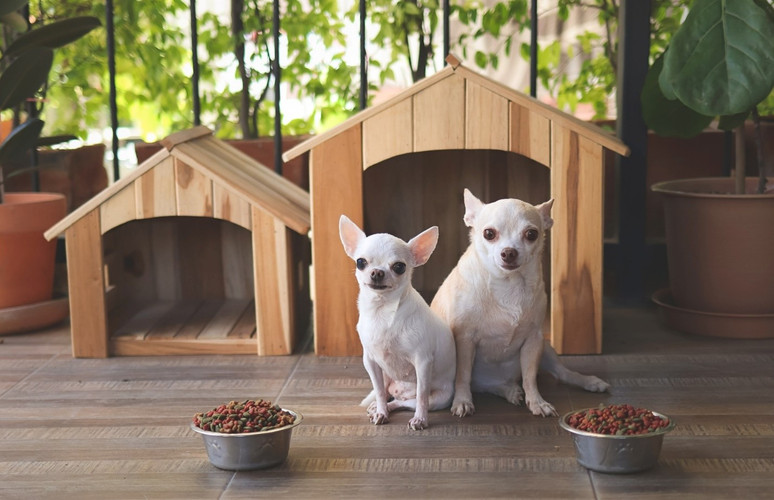What to Know About Owning Chihuahuas
You're thinking about owning a lap dog, and your mind immediately goes to the Chihuahua, a Latin American-originating breed known for its small size and strong temperament. While you think it is adorable and likely picture carrying one around with you, learn more about its origins, care, personality and other factors:
Origins
The Chihuahua's origins go back as far as the 12th century - if not before - to the Aztec empire. Attesting to its strength and popularity, it later emerged in the 19th century in the Mexican state of Chihuahua. The American Kennel Club added the breed toward the early part of the 20th century.
The Chihuahua hasn't strayed too far from its origins and, today, continues to feel comfortable in warmer climates. Two variations of this breed can be found: Smooth coat refers to a short-haired Chihuahua, and long-coat describes a dog with somewhat longer hair. The American Kennel Club places it in the toy group based on size.
No matter the hair length, Chihuahuas are one of the smallest breeds around, having a round head that's large in proportion to its body and round, large eyes. The typical dog measures five to eight inches in length and weighs under 10 pounds. Colors range from light tan to brown and may include some striping.
Temperament
Despite their small size, Chihuahuas often have a confident, commanding presence and attempt to rule your household. These factors translate to significant independence, intelligence and frequent barking.
In owning a chihuahua, you'll find that this breed can be:
- Extremely affectionate yet needy and requiring attention
- Active but will tire out easily
- Protective of those it loves
- Controlling, especially to other pets you own
- Somewhat stubborn - meaning that training early on becomes essential
As a result, Chihuahuas:
- Are more likely to experience separation anxiety compared to other dogs.
- Become fond of their owners but can be wary of, if not snippy toward, strangers.
- Aren't ideal for households with young children or several pets; instead, this breed gets along better with older children and teens.
- Tend to have strong, dominant personalities.
- Are barkers by default, especially when not trained properly or given enough physical and mental stimulation.
- Should be trained and socialized early on before bad habits and stubbornness set in.
Training
As already mentioned, begin training your chihuahua as soon as possible. Positive reinforcement becomes key for controlling barking and showing your pet that you're in charge. These dogs tend to respond better to more active instruction, as well as obedience-school environments.
On top of establishing a sense of hierarchy in your household, you'll want to:
- Prioritize socialization from the get-go, including with other people and pets.
- Take care in house-training: Consider having your dog use and explore a dedicated area, rather than the full household all at once. For relieving itself, lay down pet pads instead of taking it outdoors, as Chihuahuas can be sensitive to wet and cold conditions.
Grooming
Short hair often means that Chihuahuas get labeled as low-maintenance dogs. For smooth-coat varieties, occasional brushing and bathing are sufficient.
Chihuahuas with longer coats, on the other hand, are more prone to matting. On top of using a product like Eye Envy® Moisturizing Pet Shampoo to achieve a shiny, healthy coat, this variety needs to be brushed at least once per week and is more likely to shed.

Health Concerns
Be mindful of a number of health concerns as you own a chihuahua:
- Why do Chihuahuas shake? Generally, the short hair means that this breed gets cold easily. Make sure your home has blankets and a heating pad, and provide your pup with a sweater for heading outside.
- Chihuahuas have a higher likelihood of certain heart conditions due to genetic factors.
- This breed is also more likely to develop epilepsy.
- Chihuahuas are more sensitive to vaccinations compared to other breeds. Your veterinarian may recommend spacing out its vaccination schedule.
- It can gain weight easily, and in turn, you are advised to monitor your pet's diet and activity levels.
- Chihuahuas also tend to develop more dental issues compared to other breeds.
- Chihuahuas are born with shallow eye sockets. This condition results in their familiar bulging eyes, and it additionally contributes to poor eye drainage, creating tear stains. Eye Envy® Tear Stain Facial Cleanser, Tear Stain Remover Wipes and Tear Stain Remover Kits help clean away staining and manage this condition.
Despite these concerns, Chihuahuas have a lifespan of about 15 years.
Activity Levels
You'll quickly notice that Chihuahuas are energetic dogs. Regular physical activity helps them burn this energy and remain mentally stimulated.
You're advised to play running games, take them for regular walks or, after socializing them, meet with other dogs of a similar size.
As a note, a Chihuahua's size makes it more vulnerable to predators, getting kicked or stepped on or being attacked by a larger dog. Keep a watch on your pup, and be prepared to pick them up if you spot danger or if it starts to appear tired.

